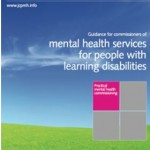
People with learning disabilities have an increased prevalence of mental health problems compared to the general population, however, in the absence of an agreed model there is currently a wide variety of provision, including community and bed-based services.
The Joint commissioning panel for mental health have produced a guide for commissioners to describe the current understanding of the evidence base as well as what this means for the provision of effective and accessible services.
The guide identifies ten key messages for commissioners around things to consider:
- Prevalence of mental health problems in people with learning disabilities is considerably higher than the general population
- There are often coexisting autistic spectrum disorders, behaviours that challenge services, offending behaviour, or physical health conditions
- In the absence of a universally agreed commissioning model, the NHS England objective is to ensure the provision of safe, appropriate, high quality care.
- Access to generic and specialised mental health services can be difficult so there is a need for reasonable adjustments joint protocols and clear pathways.
- Quality should be measured from the perspective of the individual and their family.
- Positive experiences are built through partnerships to achieve timely and seamless advice and support.
- Successful services provide individualised pathways of care, person-centred through coordinated assessment of need, agreement of outcomes, provision of care and treatment, and joint review
- Provider partnerships in primary and acute care, with local authorities builds better understanding of needs
- Commissioning of mental health services should support development of local, person-centred services, supporting the development of skilled local providers
- Evaluation of outcomes, evidence of effectiveness, safety and user satisfaction are key for further development
Download Guidance for commissioners of mental health services for people with learning disabilities, Joint Commissioning Panel for Mental Health

@WELDBlog Useful information! Thanks for sharing!